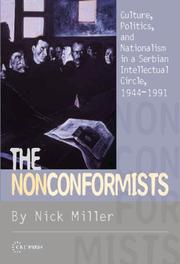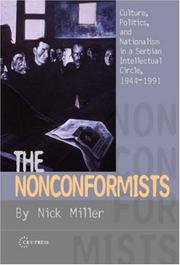| Listing 1 - 2 of 2 |
Sort by
|

ISBN: 9786155211362 9639776130 9637326936 9789637326936 9786611376864 2821815085 1281376868 1429499605 6155211361 9781429499606 9781281376862 9789639776135 9782821815087 6611376860 Year: 2007 Publisher: Budapest New York Central European University Press
Abstract | Keywords | Export | Availability | Bookmark
 Loading...
Loading...Choose an application
- Reference Manager
- EndNote
- RefWorks (Direct export to RefWorks)
Serbia's national movement of the 1980s and 1990s, the author suggests, was not the product of an ancient, immutable, and aggressive Serbian national identity; nor was it an artificial creation of powerful political actors looking to capitalize on its mobilizing power. Miller argues that cultural processes are too often ignored in favor of political ones; that Serbian intellectuals did work within a historical context, but that they were not slaves to the past. His subjects are Dobrica Ćosić (a novelist), Mića Popović (a painter) and Borislav Mihajlović Mihiz (a literary critic). These three influential Serbian intellectuals concluded by the late 1960s that communism had failed the Serbian people; together, they helped forge a new Serbian identity that fused older cultural imagery with modern conditions.
Ćosić, Dobrica, --- Popović, Mića --- Mihajlović-Mihiz, Borislav, --- Popović, Miodrag-Mića --- Popoviḱ, Miḱa --- Поповић, Мића --- SRS --- RS de Serbije --- SR Srbija --- Srbija --- Servia --- Sot︠s︡ialisticheskai︠a︡ Respublika Serbii︠a︡ --- Serbii︠a︡ --- Narodna Republika Srbija --- N.R. Serbii︠a︡ --- NR Serbii︠a︡ --- Socialist Republic of Serbia --- Republic of Serbia --- Socijalistička Republika Srbija --- Republika Srbija --- People's Republic of Serbia --- Szerbia --- Србија --- Intellectuals --- Intelligentsia --- History --- Criticism and interpretation. --- Serbia --- Intellectual life --- Mihajlović-Mihiz, Borislav, --- Popović, Mića --- Ćosić, Dobrica, --- Persons --- Social classes --- Specialists --- Tchossitch, Dobritsa, --- Ḱosiḱ, Dobrica, --- Ćosić, Dobroslav, --- Ћосић, Добрица, --- Serbia and Montenegro --- Mihiz, Borislav Mihajlović-, --- Mihajlović, Borislav, --- Михиз, Борислав Михаијловић, --- Михаијловић-Михиз, Борислав, --- 20th century, Communism, History, Identity, Intellectuals, Nationalism, Serbia, Yugoslavia.

ISBN: 9786155211362 6155211361 2821815085 1281376868 9786611376864 1429499605 9637326936 9639776130 Year: 2007 Publisher: Budapest ; New York : Central European University Press,
Abstract | Keywords | Export | Availability | Bookmark
 Loading...
Loading...Choose an application
- Reference Manager
- EndNote
- RefWorks (Direct export to RefWorks)
Serbia's national movement of the 1980s and 1990s, the author suggests, was not the product of an ancient, immutable, and aggressive Serbian national identity; nor was it an artificial creation of powerful political actors looking to capitalize on its mobilizing power. Miller argues that cultural processes are too often ignored in favor of political ones; that Serbian intellectuals did work within a historical context, but that they were not slaves to the past. His subjects are Dobrica Ćosić (a novelist), Mića Popović (a painter) and Borislav Mihajlović Mihiz (a literary critic). These three influential Serbian intellectuals concluded by the late 1960s that communism had failed the Serbian people; together, they helped forge a new Serbian identity that fused older cultural imagery with modern conditions.
Intellectuals --- History --- Ćosić, Dobrica, --- Popović, Mića --- Mihajlović-Mihiz, Borislav, --- Criticism and interpretation. --- Serbia --- Intellectual life --- 20th century, Communism, History, Identity, Intellectuals, Nationalism, Serbia, Yugoslavia. --- Intelligentsia --- Persons --- Social classes --- Specialists --- Popović, Miodrag-Mića --- Popoviḱ, Miḱa --- Поповић, Мића --- Mihiz, Borislav Mihajlović-, --- Mihajlović, Borislav, --- Михиз, Борислав Михаијловић, --- Михаијловић-Михиз, Борислав, --- Tchossitch, Dobritsa, --- Ḱosiḱ, Dobrica, --- Ćosić, Dobroslav, --- Ћосић, Добрица, --- N.R. Serbii︠a︡ --- Narodna Republika Srbija --- NR Serbii︠a︡ --- People's Republic of Serbia --- Republic of Serbia --- Republika Srbija --- RS de Serbije --- Serbii︠a︡ --- Servia --- Socialist Republic of Serbia --- Socijalistička Republika Srbija --- Sot︠s︡ialisticheskai︠a︡ Respublika Serbii︠a︡ --- SR Srbija --- Srbija --- SRS --- Szerbia --- Србија --- Serbia and Montenegro --- Cosic, Dobrica, --- Popovic, Mica --- Mihajlovic-Mihiz, Borislav,
| Listing 1 - 2 of 2 |
Sort by
|

 Search
Search Feedback
Feedback About UniCat
About UniCat  Help
Help News
News